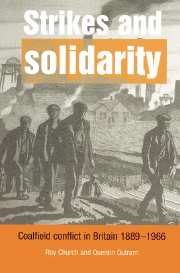Book contents
- Frontmatter
- Contents
- List of figures and tables
- Preface
- List of abbreviations
- 1 Interpreting coalfield conflict: focus and formulations
- 2 Tradition and modernity: the mining industry 1889–1940
- 3 Employers and workers: organizations and strategies
- 4 Employers and workers: ideologies, attitudes and political orientations
- 5 Configurations of strike activity
- 6 Strike participation and solidarity before 1912
- 7 Strikes, organization and consciousness in 1912 and after
- 8 Conflictual context? The ‘isolated mass’ revisited
- 9 Mining and modernity: size, sectionalism and solidarity
- 10 The foundations of strike propensity
- 11 Miners and management: agency and action
- 12 Industrial relations and strikes after nationalization
- 13 International perspectives
- 14 Myths and realities: strikes, solidarity and ‘militant miners’
- General appendix
- List of references
- Index
2 - Tradition and modernity: the mining industry 1889–1940
Published online by Cambridge University Press: 04 December 2009
- Frontmatter
- Contents
- List of figures and tables
- Preface
- List of abbreviations
- 1 Interpreting coalfield conflict: focus and formulations
- 2 Tradition and modernity: the mining industry 1889–1940
- 3 Employers and workers: organizations and strategies
- 4 Employers and workers: ideologies, attitudes and political orientations
- 5 Configurations of strike activity
- 6 Strike participation and solidarity before 1912
- 7 Strikes, organization and consciousness in 1912 and after
- 8 Conflictual context? The ‘isolated mass’ revisited
- 9 Mining and modernity: size, sectionalism and solidarity
- 10 The foundations of strike propensity
- 11 Miners and management: agency and action
- 12 Industrial relations and strikes after nationalization
- 13 International perspectives
- 14 Myths and realities: strikes, solidarity and ‘militant miners’
- General appendix
- List of references
- Index
Summary
The social and economic history of the nineteenth and twentieth centuries has often been written around one major theme: the emergence and development of a recognizably ‘modern’ economy and society. Since one of the characteristics of modernity is incessant innovation, the ‘pre-modern’ period comes to be seen as, or indeed defined as, ‘traditional’. The movement from tradition to modernity can be discerned in almost every sphere of social and economic life, and in each sphere different points may seem to be key moments in the transition from one form of life to another. In the relationships between masters and servants or between employers and workers many of the key changes have been perceived at least since the time of Marx. They are the production of commodities by machinery rather than by tools alone, the detailed division of labour, the growth of large-scale organization and bureaucracy, the growth of large-scale settlements or urbanization, and finally the development of an integrated world economy. Many commentators have argued that during this transition relationships between employers and workers became at the same time more distant but marked by an increasing measure of control and discipline by the former over the latter (Burgess 1975; Stearns 1975).
Until perhaps the mid-nineteenth century the British coalmining industry could claim to be in the van of movements towards modernity. Long before the nineteenth century, coalmining had required the investment of large accumulations of capital in order to sink shafts and construct pumping machinery.
- Type
- Chapter
- Information
- Strikes and SolidarityCoalfield Conflict in Britain, 1889–1966, pp. 17 - 37Publisher: Cambridge University PressPrint publication year: 1998



